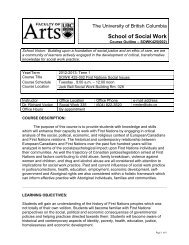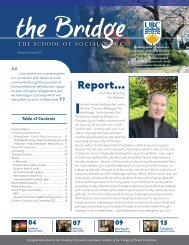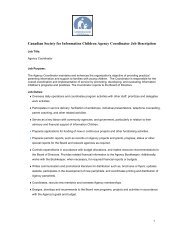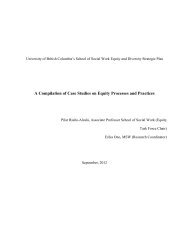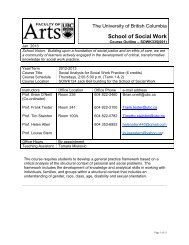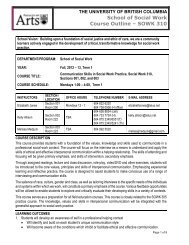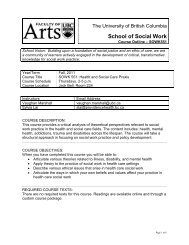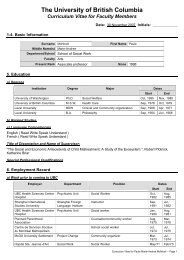Course Outline Format - School of Social Work - University of British ...
Course Outline Format - School of Social Work - University of British ...
Course Outline Format - School of Social Work - University of British ...
Create successful ePaper yourself
Turn your PDF publications into a flip-book with our unique Google optimized e-Paper software.
SOWK550(004) 2012-2013<br />
Readings<br />
Oldfield, Kenneth, 2010, Reflections on Theory in Action: Using Critical Theory to Teach Public<br />
Administration Students About <strong>Social</strong> Class Inequalities, Administrative Theory & Praxis, Vol. 32:3,<br />
450-472. (available at UBC on-line)<br />
Dutheil, April, Jordan Konek & Frank Tester, 2012, Unequal Exchange: Western economic logic and<br />
Inuit/Qablunaat research relationships, paper presented at the International Polar Year Conference,<br />
Montreal, PQ, April 22-27, 2012 (in press). (reading package)<br />
BC Provincial Ombudsperson’s Annual Report, 2010-2011. Go to the Ombudsperson’s website (online).<br />
The annual report provides summaries <strong>of</strong> cases dealt with by the ombudsperson’s <strong>of</strong>fice.<br />
Using the table <strong>of</strong> contents, identify a case that interests you from the Ministry <strong>of</strong> Children and<br />
Family Development, Health, <strong>Social</strong> Development, etc. Come to class prepared to present the case<br />
for discussion.<br />
Week 8, Oct. 31<br />
Human Rights, <strong>Social</strong> Justice and Disability<br />
Resource<br />
Bonnie Sherr Klein, 2006, Shameless: The Art <strong>of</strong> Disability. The National Film Board <strong>of</strong> Canada.<br />
This film raises many issues related to disability. Come prepared to be a movie critic. Take notes as<br />
to what is positive about the film and what you find to be its weaknesses. Keep a list <strong>of</strong> the issues<br />
that the film deals with.<br />
Following the film we will have a discussion led by Daryl Rock. Daryl is a good friend <strong>of</strong> mine and<br />
Chair <strong>of</strong> the Global Accessibility Initiative. He has worked with the Rick Hansen Foundation. Daryl<br />
retired from the Federal Public Service in 2008 after working for the <strong>Social</strong> Sciences and Humanities<br />
Research Council and other Departments concerned with research, development and Canadian<br />
social policy.<br />
Week 9, Nov. 7<br />
Week 10, Nov. 14<br />
Week 11, Nov. 21<br />
These three weeks are set aside for student presentations (see assignments). Each student will<br />
have half <strong>of</strong> the class (approximately 1 hour 20 minutes) to present on the human rights covenant,<br />
charter, declaration, etc. <strong>of</strong> her or his choice. This schedule assumes that we have a maximum <strong>of</strong> 6<br />
students and 6 presentations. If there are sufficient numbers in the class, we will go to group<br />
presentations and/or use the last class (Nov. 28) for this purpose.<br />
Week 12, Nov. 28<br />
Putting <strong>Social</strong> Justice/Human Rights Into Practice (Readings)<br />
Ife, Jim, 2008, Human Rights and <strong>Social</strong> <strong>Work</strong>: Towards Rights-Based Practice, Cambridge & New<br />
York, Cambridge <strong>University</strong> Press. (Chapter 9, Constructing Human Rights for <strong>Social</strong> <strong>Work</strong> Practice,<br />
Chapter 10, Achieving Human Rights Through <strong>Social</strong> <strong>Work</strong> Practice, and Chapter 11, Respecting<br />
Human Rights in <strong>Social</strong> <strong>Work</strong> Practice).<br />
8



